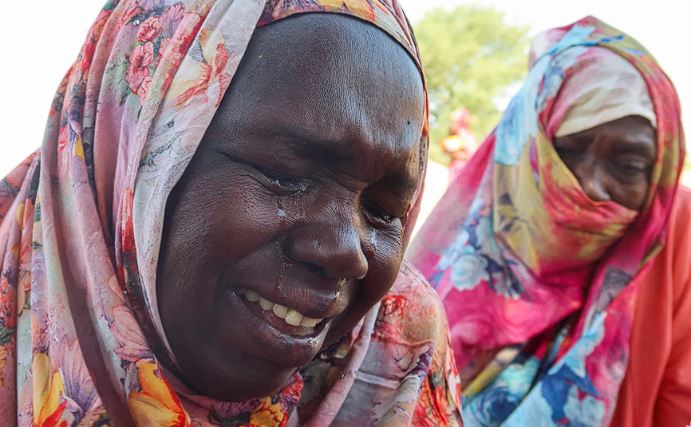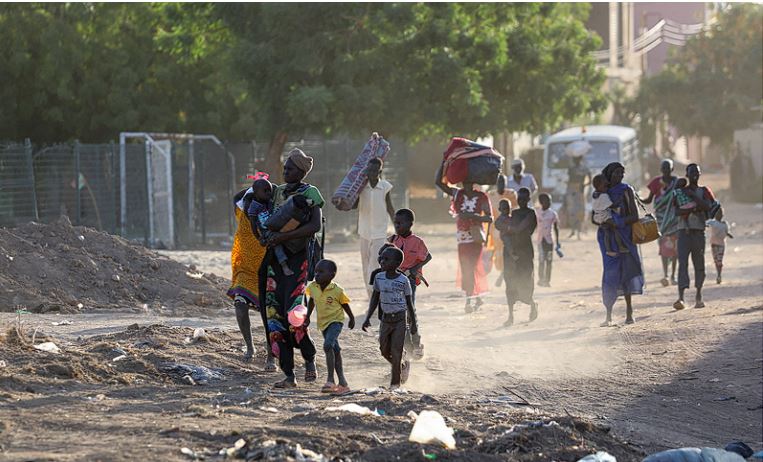
.
An ongoing humanitarian disaster is unfolding in Sudan largely out of sight of mainstream audiences. Fighting between the Sudanese Armed Forces (SAF) and the paramilitary Rapid Support Forces (RSF) has displaced more than 8.6 million people in one of the world’s poorest and most vulnerable nations.
To understand this disaster, one needs to know at least some of the troubled recent history of Sudan.
Internal rivalries
The SAF support General Abdel Fattah al-Burhan, Sudan’s de facto ruler, while the RSF’s militias are loyal to General Mohamed Hamdan Dagalo, also known as Hemedti.
The RSF was founded by long time Sudanese military leader Omar al-Bashir (regarded by most as an authoritarian and brutal dictator) to crush a rebellion in Darfur in 2003. The RSF’s actions in Darfur earned them a global reputation for committing atrocities including extra-judicial killings, mass rape, the burning and looting of villages, the mass displacement of civilians and the conscription of child soldiers.
In 2013, the RSF was partially integrated into the main SAF before deployment in South Darfur and overseas to Yemen and Libya.
The RSF and SAF combined to remove Bashir in 2019. The RSF (true to form) then attacked a peaceful sit-in Khartoum, killing hundreds and raping dozens more. A power-sharing deal towards a civilian democratic government, was interrupted by a military coup in October 2021.
The coup put the two branches of the army back in charge but it faced weekly protests, renewed international isolation and a deepening economic crisis. Hemedti and the RSF swung behind the plan for a new transitional government, which the SAF and Burhan felt threatened by.
Hemedti and the RSF export gold from illegal mines (an echo of the tragedy of Congo are the artisanal mines that fund rival militias) and can summon a well equipped and battle-hardened military numbering tens of thousands of fighters in various militias.
Renewed fighting
Warning signs had been coming out of Khartoum since early 2022 that an outbreak of violence was likely and in April last year open fighting began between the SAF and the RSF. Human Rights Watch accuses the RSF of “crimes against humanity” and “genocide” in West Darfur State, a grisly repeat of their atrocities in Darfur twenty years earlier.
The UN’s World Food Programme has warned of the deteriorating situation in Darfur, as advancing RSF forces attempt to take control of the strategic city of el-Fasher, where 500,000 refugees are sheltering. HRW are calling for an arms embargo on the RSF.
Superpower involvement
As always, where is there is money there are people willing to supply weapons and where this is conflict there are regional and global powers trying to gain influence in the region.
Burhan and the SAF are supported by Abdel-Fattah al-Sisi in Egypt, another nation in which a military coup displaced movements towards a civilian democracy. Egypt has launched a ‘peace process’ in parallel with the United States, Saudi Arabia and the African regional grouping of IGAD. Rumours of Egyptian air strikes on behalf of the SAF abound but evidence for them is hard to find.
Russian involvement in Sudan appears to pivot around two things:
(a) A potential flow of income from mining rights secured by Wagner PMC over Sudan’s gold deposits in mines controlled by the RSF. This had led to a detachment of Ukrainian special forces (at war with Wagner in Bakhmut at the time) supporting the SAF against the RSF. Wagner no longer appears to be active in Sudan.
(b) The prospects for a Russian Naval base near Port Sudan, on the Red Sea. Discussions over this had lapsed as civil war engulfed Sudan but now seem very much back on.
This report would suggest that Russia has switched sides and is now ready to throw its substantial military support behind the Sudanese Government in exchange for its base..
U.S. involvement is harder to quantify but it seems unlikely they would be uninvolved as Russia progressed a strategically significant (but small) naval base on the Red Sea. After the coup and led by the United States, Western powers supported the new transition deal that triggered the eruption of fighting. A number of observers have speculated as to whether this was by accident or design. The U.S. has been in contact with the RSF but has recently brought sanctions against RSF commanders .
For several years, Hemedti’s most important ally has been the United Arab Emirates. The UAE has pro-actively sought to restrict Islamist influence, intervening previously in Libya and Yemen. Hemedti has presented himself as an ally against Islamist-leaning factions in the SAF. UAE is accused of sending arms to the RSF and laundering Hemedti’s gold mine profits.
A deepening crisis
More than nine million people have fled their homes in Sudan, and the humanitarian crisis worsens every day.
“I expect that by September, we’re looking at about 70% of the population being extremely hungry,” said Timmo Gaasbeek, a food security expert who has worked in Sudan.
“That could lead to two-and-a-half million deaths, or more. It could be as many as four million. There is just not enough food.”
While the world’s attention is rightly drawn to Israel’s genocide in Gaza and Israel’s slow starvation of over 2.2 million Palestinians by siege, we must not allow the looming catastrophe in Sudan to go unheard and unseen.
The looting and subsequent withdrawal of colonial powers from nations like Sudan (which was a British colony) has proved disastrous. While it is not beyond the global and regional powers jostling for geopolitical advantages in Sudan to cease the flow of money and weapons that fuel this conflict, they won’t cease their meddling nor address the plight of the civilian population unless public opinion forces them to.
The RSF stands accused of ethnic cleansing and genocide and nobody should be sending them weapons or laundering their money, pressure should be brought to bear upon the UAE for their ongoing support for the RSF. Russia should not be fuelling the civil war in Sudan by attempting to support a military solution in support of its prospective military base.
An immediate ceasefire is needed in Sudan and a transition towards a new civilian government. If ever there was a case for one the West’s oft touted ‘humanitarian interventions’ it is now. Emergency aid needs to flow into Sudan in large quantities, a peacekeeping force dispatched and negotiations for peace commenced. International efforts should be focused on disarming the militias and army units left over from the reign of Omar al-Bashir, not picking sides in the hope of backing a winner.
If immediate action isn’t taken to avert disaster in Sudan then the resultant catastrophe will be worse than Gaza and millions may die. Sudan ought to trouble the consciences of global citizens every bit as much as Gaza.

More Stories
Ukraine pays the price for the West’s addiction to propaganda over reality
Radical Friendship 2: Healing the divisive human need for certainty
Nobody should be surprised that Fascism is on the march across Europe.